Estimator Commercial Construction
In the world of commercial construction, estimating plays a pivotal role in ensuring the success of a project. Estimators are the unsung heroes who translate architectural dreams into financial realities, balancing cost with quality to deliver projects on budget and on time. This intricate process involves a blend of technical knowledge, industry experience, and meticulous planning. Accurate estimating not only secures project financing but also lays the groundwork for efficient resource allocation, scheduling, and risk management. Let’s dive into the multifaceted world of commercial construction estimating, exploring its importance, processes, and the skills required to excel in this field.
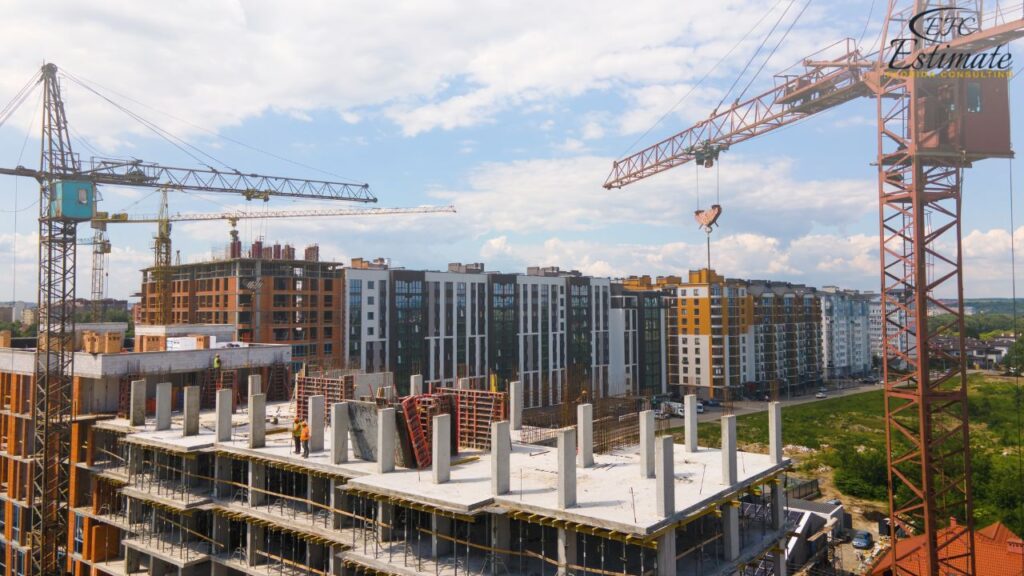
Understanding Commercial Construction Estimating
Definition of Commercial Construction Estimating
Commercial construction estimating involves predicting the costs associated with building commercial properties like offices, malls, and hotels. This process includes calculating the costs of materials, labor, equipment, and other resources necessary for the project. For example, the cost of materials can range from $80 to $240 per square foot, depending on the quality and type of materials used. Estimators must consider various factors such as the scale of the project, design specifications, and regulatory requirements. By doing so, they ensure that the project is financially viable and aligns with the client’s budget and timeline. Estimating also encompasses evaluating potential risks and uncertainties, ensuring that contingencies are in place to handle any unexpected challenges.
Differences Between Commercial and Residential Estimating
While both commercial and residential estimating require precision, the complexity and scale of commercial projects often demand more detailed and varied expertise. Commercial projects typically have larger budgets, more stringent regulations, and a higher level of stakeholder involvement compared to residential projects. For instance, a commercial project may involve multiple floors, complex HVAC systems, and extensive safety protocols, all of which add layers of complexity to the estimating process. Additionally, commercial construction often requires specialized materials and advanced technologies, which can drive costs significantly higher, sometimes up to several million dollars for large-scale projects.
Roles and Responsibilities of a Commercial Construction Estimator
Initial Project Evaluation
At the project’s onset, estimators evaluate the feasibility of the proposed construction. This involves reviewing project plans, specifications, and understanding client requirements to form an initial cost estimate. For example, a preliminary cost estimate might be around $800,000 for a small commercial building. Estimators must assess whether the project is achievable within the set budget and timeframe. This stage also involves identifying potential challenges and risks that could impact the project’s financial feasibility. By conducting a thorough initial evaluation, estimators can provide clients with realistic expectations and a solid foundation for the project’s financial planning.
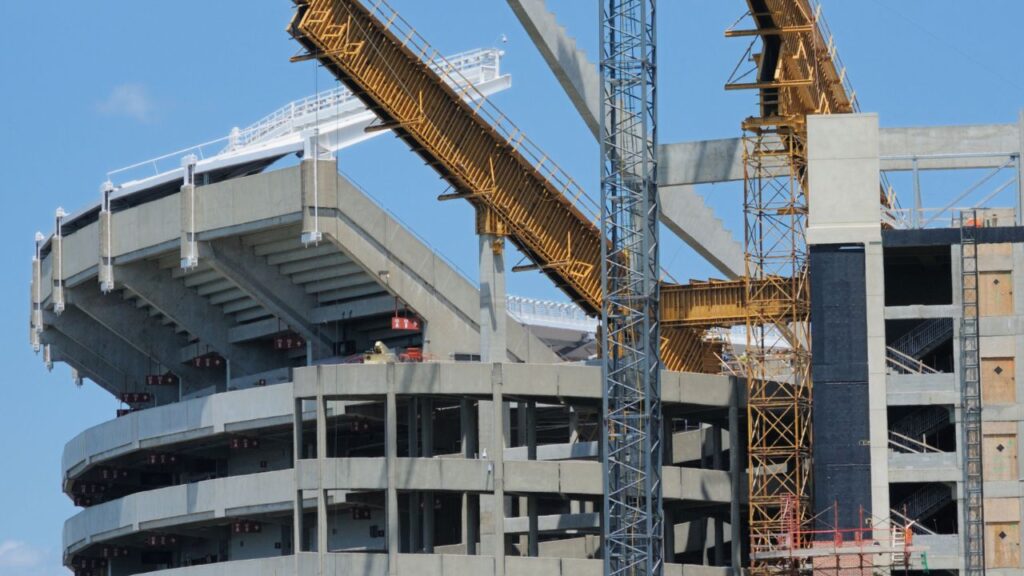
Detailed Cost Analysis
Estimators delve into a meticulous analysis of all costs involved. They break down the project into components, assessing costs for materials, labor, equipment, and subcontractors. For instance, labor costs might constitute 30-50% of the total project cost, potentially reaching hundreds of thousands of dollars. This stage is crucial for creating a detailed and accurate budget. Each component must be scrutinized to avoid any oversight that could lead to budget overruns. Estimators use historical data, industry standards, and supplier quotes to ensure their analysis is grounded in reality. This detailed cost analysis helps in identifying potential cost-saving opportunities and optimizing resource allocation.
Coordination with Project Stakeholders
Effective communication is key. Estimators coordinate with architects, engineers, contractors, and clients to ensure that all aspects of the project are understood and accurately reflected in the estimate. This collaboration ensures that any changes in design or scope are promptly incorporated into the cost estimate, preventing surprises down the line. Regular meetings and updates help keep all stakeholders aligned and informed about the project’s financial status. This ongoing coordination fosters transparency and trust, which are essential for successful project execution. For example, if a design change increases costs by $80,000, this must be communicated and agreed upon promptly.
Key Skills Required for Commercial Construction Estimators
Analytical Skills
A strong analytical mindset is essential for breaking down complex projects into manageable parts and accurately forecasting costs. Estimators must analyze large volumes of data, including blueprints, project plans, and market prices. This requires a keen eye for detail and the ability to identify potential cost-saving opportunities without compromising on quality or safety. Analytical skills also enable estimators to assess the impact of various factors on project costs, such as changes in material prices, labor rates, and technological advancements. For example, identifying a $16 per square foot saving on flooring materials can lead to substantial overall savings on a large project.
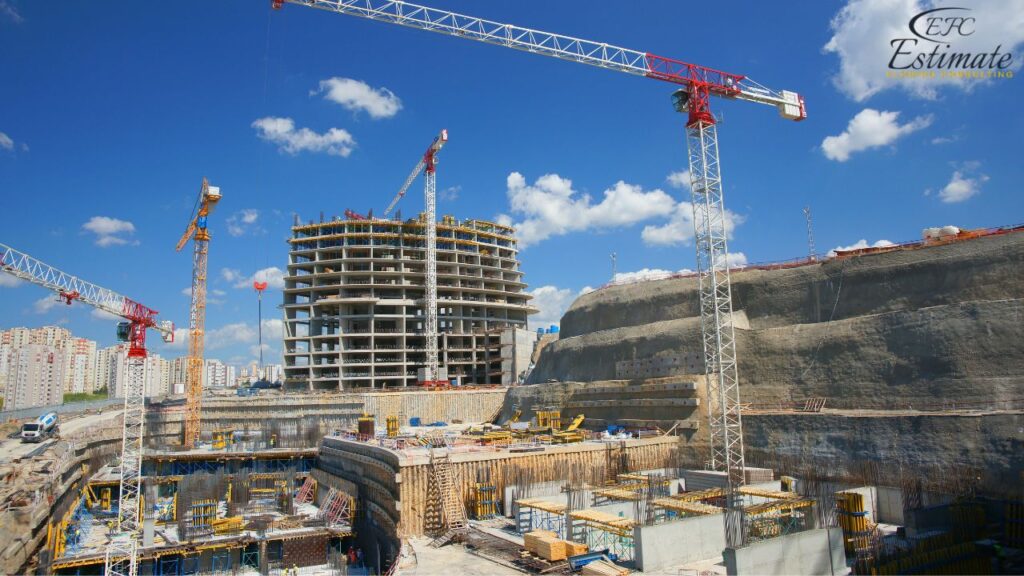
Attention to Detail
Accuracy is paramount in estimating. A small error can lead to significant budget overruns, so attention to detail is crucial in all stages of the estimating process. Estimators must double-check their calculations, verify supplier quotes, and ensure that all costs are accounted for. This meticulous approach helps avoid costly mistakes and ensures the project stays within budget. For instance, underestimating the cost of concrete by just $3.20 per cubic yard on a large project can lead to a shortfall of thousands of dollars. Attention to detail also involves being thorough in documenting assumptions and methodologies, which can be critical for future reference and audits.
Communication and Negotiation Skills
Estimators must convey complex information clearly and negotiate effectively with suppliers and subcontractors to secure the best prices without compromising quality. Good communication skills help in articulating the project’s needs and requirements to various stakeholders. Negotiation skills are equally important, as securing favorable terms can lead to substantial cost savings for the project. For instance, negotiating a 5% discount on materials can save tens of thousands of dollars on a large-scale project. Effective communication also involves listening to stakeholder concerns and addressing them promptly, ensuring that everyone is on the same page.
Technical Proficiency
Proficiency in construction software and understanding technical drawings and specifications are vital. Estimators often use specialized software to create precise and reliable estimates. Knowledge of tools like ProEst, PlanSwift, and Sage Estimating allows them to streamline the estimating process, reduce errors, and integrate seamlessly with other construction management tools. For example, using ProEst can improve accuracy by incorporating real-time cost data and historical project information. Technical proficiency also includes staying updated with the latest industry technologies and best practices, which can enhance the accuracy and efficiency of estimates.
Download Template For Construction Project Breakdown
- Materials list updated to the zip code
- Fast delivery
- Data base of general contractors and sub-contractors
- Local estimators

Stages of the Estimation Process
Pre-Construction Stage
This initial stage involves feasibility studies, preliminary cost estimates, and identifying potential risks. Estimators review project plans, conduct site visits, and gather preliminary data to form an initial cost projection. For instance, an initial feasibility study might estimate the total project cost at $3.2 million. This stage sets the foundation for more detailed estimates and helps in determining whether the project should proceed. By assessing feasibility early on, estimators can provide clients with a clear understanding of the project’s financial outlook and potential challenges.
Design Development Stage
As the design evolves, estimators refine their estimates, incorporating more detailed information and adjusting for any changes in scope or design. This stage involves close collaboration with architects and engineers to ensure that the evolving design stays within budget. Detailed cost breakdowns are developed, and potential cost-saving measures are explored. For example, substituting a more cost-effective material can reduce costs by $160,000. During this stage, estimators must be flexible and responsive to design changes, ensuring that updated estimates reflect the latest project requirements.
Pre-Construction Stage
This initial stage involves feasibility studies, preliminary cost estimates, and identifying potential risks. Estimators review project plans, conduct site visits, and gather preliminary data to form an initial cost projection. For instance, an initial feasibility study might estimate the total project cost at $3.2 million. This stage sets the foundation for more detailed estimates and helps in determining whether the project should proceed. By assessing feasibility early on, estimators can provide clients with a clear understanding of the project’s financial outlook and potential challenges.
Bidding Stage
During this stage, estimators prepare bid proposals, often competing against other contractors. They must ensure their bids are competitive yet realistic. This involves presenting a clear and detailed breakdown of costs, demonstrating value, and ensuring that the proposal aligns with the client’s requirements. A well-prepared bid can be the difference between winning and losing a project. For instance, a detailed and competitive bid for an $8 million project could secure the contract over less detailed proposals. The bidding stage also involves strategic decision-making, where estimators must balance competitiveness with profitability.
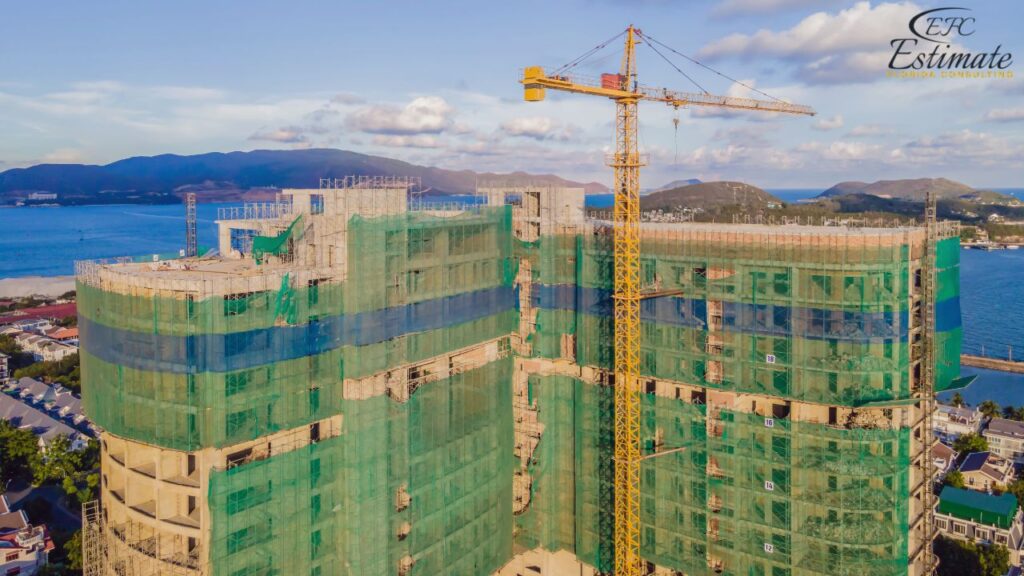
Construction Stage
Even after construction begins, estimators continue to play a role, updating estimates based on actual costs and addressing any unforeseen expenses. They monitor the project’s financial progress, adjust for any changes in scope, and ensure that the project remains within budget. For example, addressing a $80,000 unexpected expense promptly can prevent larger financial issues. Regular financial reporting and adjustments are essential to managing the project’s financial health. Estimators also play a key role in managing change orders, ensuring that any modifications are accurately reflected in the project budget.
Tools and Software Used in Commercial Construction Estimating
Popular Estimating Software
Software like ProEst, PlanSwift, and Sage Estimating are popular tools that help estimators create detailed and accurate cost estimates efficiently. These tools offer features like cost databases, integration with project management systems, and real-time collaboration capabilities. For instance, using PlanSwift can speed up the takeoff process, saving hours of manual work and reducing the chance of errors. They help streamline the estimating process and ensure consistency across different projects. By leveraging these tools, estimators can enhance their productivity and reduce the risk of errors.
Integration with Other Construction Management Tools
Many estimating software solutions integrate with project management tools, helping maintain a seamless workflow throughout the project lifecycle. For instance, integrating ProEst with project management software like Procore can streamline communication and ensure that everyone is working with the most current data. This integration allows for real-time updates, improved accuracy in tracking project costs, and more efficient resource management. By having a unified platform, teams can avoid costly errors and delays, ensuring that the project stays on track both financially and in terms of schedule.
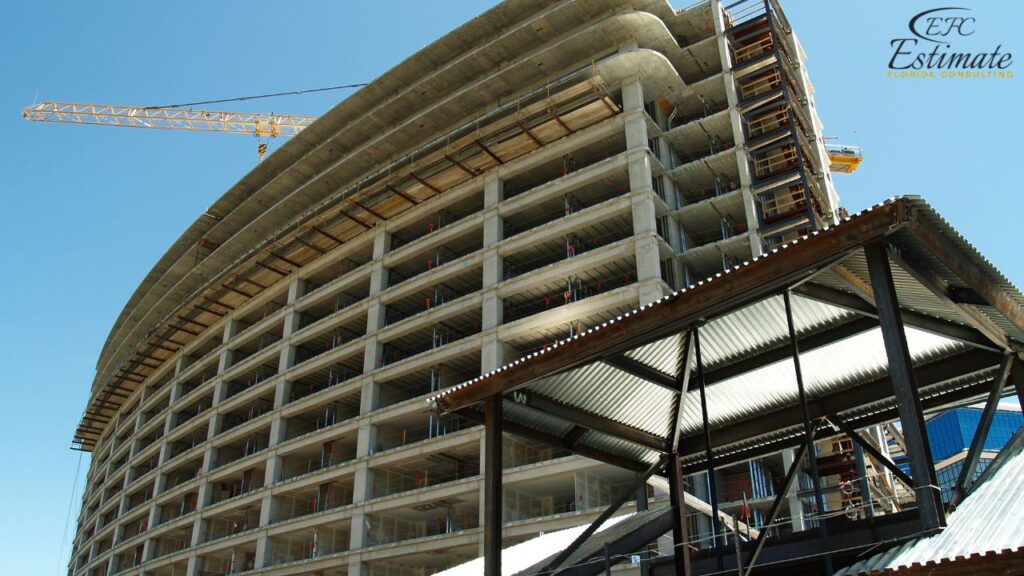
Benefits of Using Estimating Software
These tools streamline the estimating process, reduce human error, and allow for easy updates and adjustments as project details evolve. Estimating software can automate repetitive tasks, provide access to updated cost databases, and generate comprehensive reports. This not only saves time but also improves the accuracy and reliability of estimates. For example, using Sage Estimating can reduce estimate preparation time by up to 50%. Additionally, these tools facilitate better data management and analysis, helping estimators make informed decisions.
Challenges in Commercial Construction Estimating
Dealing with Uncertain Market Conditions
Market conditions can be unpredictable, with fluctuating material costs, labor shortages, and economic instability affecting project budgets. For example, a sudden increase in steel prices by 20% can add hundreds of thousands of dollars to a project’s total cost. Estimators must stay informed about market trends and have contingency plans in place to manage these uncertainties. This might involve securing fixed-price contracts with suppliers or building in cost escalation clauses to protect against price volatility.
Managing Scope Changes
Scope changes are inevitable in any construction project, but they can significantly impact the budget if not managed properly. Estimators need to be vigilant and responsive to any changes in project specifications, ensuring that all adjustments are accurately reflected in the cost estimate. For example, adding an additional floor to a building can increase the project cost by $500,000 or more. Effective communication with stakeholders and a structured change management process are essential to mitigate the financial impact of scope changes.
Ensuring Accurate Data Collection
Accurate data collection is crucial for reliable estimating. Inaccurate or incomplete data can lead to significant cost overruns and project delays. Estimators must ensure they have access to accurate and up-to-date information, including detailed project plans, supplier quotes, and historical data. Utilizing advanced software tools can help streamline data collection and improve accuracy. For instance, using drones for site surveys can provide precise measurements and reduce the risk of human error.
Get 5 New Leads Next 7Days With Our System
- Multi-Family Building
- Hotel Building
- Hospital Building
- Warehouse Building
- High-Rise Building
- Shopping Complex
The Future of Commercial Construction Estimating
Technological Advancements
The construction industry is rapidly embracing new technologies that can enhance the estimating process. Artificial Intelligence (AI) and Machine Learning (ML) are becoming increasingly important, offering the ability to analyze vast amounts of data quickly and accurately. For example, AI can predict potential cost overruns based on historical data and current project conditions, allowing estimators to take proactive measures. These technologies can also identify patterns and trends that may not be immediately apparent, providing deeper insights into cost drivers and opportunities for optimization.
Sustainable Construction Practices
As sustainability becomes a priority, estimators need to consider the cost implications of green building practices. This includes evaluating the costs of sustainable materials, energy-efficient systems, and waste reduction measures. For example, using recycled materials can increase material costs by 10-20%, but these costs may be offset by long-term savings in energy and maintenance. Estimators must balance the initial costs with the potential benefits, ensuring that sustainable practices are financially viable.
Remote and Automated Estimating
The COVID-19 pandemic has accelerated the adoption of remote work and automation in the construction industry. Estimators can now leverage cloud-based software to collaborate with teams remotely, improving efficiency and flexibility. Automated estimating tools can handle repetitive tasks, allowing estimators to focus on more complex aspects of the project. For example, automated takeoff tools can reduce the time required for quantity measurements by up to 70%, increasing productivity and accuracy.
Conclusion
Commercial construction estimating is a complex and multifaceted process that requires a blend of technical knowledge, analytical skills, and effective communication. Accurate estimating is crucial for the financial success of any project, providing the foundation for budgeting, resource allocation, and risk management. As the industry evolves, embracing new technologies and sustainable practices will be key to staying competitive and meeting the growing demands of clients. By continuously improving their skills and leveraging advanced tools, commercial construction estimators can navigate the challenges of today’s market and deliver successful projects on time and within budget.
FAQs
A commercial construction estimator is responsible for predicting the costs associated with a construction project, including materials, labor, equipment, and other resources. They ensure the project is financially viable and provide detailed cost analyses to help manage the budget and timeline.
Market conditions, such as fluctuating material prices and labor availability, can significantly impact project costs. Estimators must stay informed about market trends and incorporate contingency plans to manage these uncertainties.
Estimators use various software tools like ProEst, PlanSwift, and Sage Estimating to create detailed and accurate cost estimates. These tools streamline the estimating process, reduce errors, and integrate with other construction management tools.
Technological advancements, such as AI and ML, are enhancing the estimating process by providing deeper insights into cost drivers and opportunities for optimization. These technologies improve accuracy, efficiency, and the ability to predict potential cost overruns.
Sustainability is increasingly important due to environmental concerns and regulatory requirements. Estimators must consider the costs of sustainable materials and practices, balancing initial costs with long-term benefits like energy savings and reduced maintenance.
Google Reviews



Process To Get Commercial Construction Estimate Report
Here I am going to share some steps to get commercial construction estimate report.
-
You need to send your plan to us.
You can send us your plan on info@estimatorflorida.com
-
You receive a quote for your project.
Before starting your project, we send you a quote for your service. That quote will have detailed information about your project. Here you will get information about the size, difficulty, complexity and bid date when determining pricing.
-
Get Estimate Report
Our team will takeoff and estimate your project. When we deliver you’ll receive a PDF and an Excel file of your estimate. We can also offer construction lead generation services for the jobs you’d like to pursue further.

